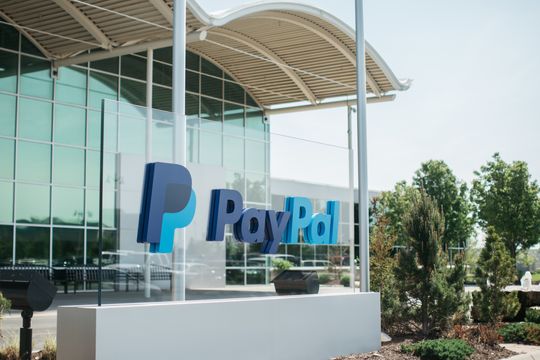Company confirms Elliott investment while announcing new CFO and cost-cutting plan
After seeing its shares lose roughly two-thirds of their value in the past year, PayPal Holdings Inc. delivered a packed earnings report Tuesday, announcing a new chief financial officer, buyback authorization and cost-savings program, while also confirming that activists at Elliott Management Corp. have taken a stake in the company.
Additionally, the company topped expectations with its second-quarter financial results while delivering a mixed update on guidance for the full year.
“We are well underway in a deep transformation of our business to regain momentum,” Chief Executive Dan Schulman said on the company’s earnings call.
PayPal shares PYPL, +1.20% jumped 11% in after-hours trading Tuesday, after rocketing to their best day in two years last week amid reports that Elliott had taken a stake in the business. Elliott confirmed the involvement in Tuesday’s report, just as the activist investor did Monday afternoon with struggling Pinterest Inc. PINS, +11.61% as it reported earnings
“As one of PayPal’s largest investors, with an approximately $2 billion investment, Elliott strongly believes in the value proposition at PayPal,” Elliott Managing Partner Jesse Cohn said in a statement included in PayPal’s release. “PayPal has an unmatched and industry-leading footprint across its payments businesses and a right to win over the near and long term.”
He added that PayPal’s report “highlights a number of steps that have been underway and are being initiated to help realize the significant value opportunity” in the business.
Schulman shared on PayPal’s earnings call that his team and the Elliott team were “completely aligned in our mutual goal to maximize shareholder value and we are substantially aligned on the areas of focus for achieving our objectives.”
The company is bringing on former Electronic Arts Inc. EA, -1.51% Chief Financial Officer Blake Jorgensen to serve in the same role at PayPal. He replaces John Rainey, who stepped down earlier this year to become Walmart Inc.’s WMT, +0.11% CFO.
Even before Jorgensen joins the company Wednesday, PayPal executives announced a variety of financial initiatives including a new $15 billion share-repurchase authorization and cost-savings program that they expect will deliver $900 million in savings this fiscal year and $1.3 billion in savings next year. The executives are targeting operating margin expansion for 2023.
The leadership team will be getting an additional shakeup in the months to come as PayPal announced that Chief Product Officer Mark Britto plans to retire at the end of the year, and a search for his replacement is ongoing.
“Bottom line, these developments should address (at least for now) many investor concerns over execution and strategic direction,” Wedbush analyst Moshe Katri said in an email.
The latest moves are all “positives,” according to Mizuho analyst Dan Dolev, who said that PayPal’s “cost basis was way too high, and it needed to return capital to shareholders.”
A key question headed into PayPal’s report was whether the company would again lower revenue guidance for the full year after a string of cuts earlier this year. Executives ended up reducing their forecast and now model roughly 10% growth on a spot basis, versus a prior outlook for 11% to 13% growth. They also model approximately 11% growth on a currency-neutral basis, which is at the low end of the company’s previous range.
“Given today’s environment, we think it’s important to be conservative,” Interim Chief Financial Officer Gabrielle Rabinovitch said on the call.
Executives also anticipate about $3.87 to $3.97 in adjusted EPS for the full year. The company’s previous forecast called for $3.81 to $3.93 in adjusted EPS.
One analyst commented on the call that the magnitude of PayPal’s cost-savings targets was more than he’d expected, but Schulman maintained that the company would continue to invest in the business.
“We were doing 100 things,” he said. “We’re now doing three or four things extremely well.”
Throughout the call, Schulman offered other signs of the company’s new priorities. While the company rolled out a QR code program two years back that was aimed at opening up in-store opportunities, he acknowledged Tuesday that it was “more impactful” and “less expensive” to try to get a bigger crack of online spending by having users pay with PayPal-linked cards.
Additionally, though executives were planning to invest in new features like stock trading this year, they’ve “reallocated [that] headcount into checkout,” which is PayPal’s core business.
For the latest quarter, the company posted a net loss of $341 million, or 29 cents a share, whereas it logged net income of $1.18 billion, or $1.00 a share, in the year-earlier quarter. The loss in the latest quarter reflected negative impacts from strategic-investment losses and a tax charge related to acquired intellectual property.
On an adjusted basis, PayPal earned 93 cents a share, down from $1.15 a share a year earlier but above the FactSet consensus, which was for 87 cents a share.
PayPal’s revenue climbed to $6.81 billion from $6.24 billion, while analysts had been modeling $6.78 billion.
The company generated $339.8 billion in total payments volume, or the value of transactions processed through its platform, up from $311.0 billion in the year-earlier quarter. Analysts were expecting $342.8 billion in TPV.
PayPal had 429 million active accounts as of the second quarter, essentially flat with its first-quarter total but up from 403 million active accounts in the second quarter of 2021. Executives said earlier this year that they would become less focused on absolute user growth as they looked to better monetize PayPal’s higher-value users.
For the third quarter, PayPal’s management team expects net revenue growth of 10%, or 12% on a currency-neutral basis. The projection would equate to about $6.80 billion, whereas analysts tracked by FactSet were looking for $6.78 billion.
PayPal executives also expect 94 cents to 96 cents in adjusted earnings per share for the third quarter, while analysts had been anticipating 95 cents.

